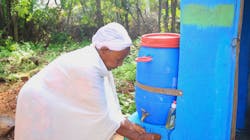3 Ways to Make Water and Sanitation Access Visible
World Water Day this year focuses on groundwater, but the theme of “Making the Invisible Visible” applies to a myriad of challenges for water, sanitation and health (WASH) access.
According to UNICEF, 2.2 billion people still lack access to safe drinking water, and more than half the global population does not have access to safe sanitation.[i] Water access is also intrinsically linked to equity, as in most countries women and girls are responsible for walking several kilometers per day to collect potable water.
While WASH access is a challenge across the globe, water systems are implemented on a local level. That means each place experiences unique vulnerabilities, and therefore requires tailored solutions based on local conditions.
That’s why Partnering for Green Growth and the Global Goals 2030 (P4G)[ii] is funding and accelerating partnerships with commercially viable solutions to make water and sanitation more equitable, accessible, and visible. We work with our partner countries to ensure our partnerships are aligned with the priorities of the countries and support them in becoming investable solutions that progress the UN Sustainable Development Goal 6 (Clean Water and Sanitation). The partnerships below are tangible solutions to improve water and sanitation, and have the potential to become commercially sustainable to ensure long-lasting impact.
1. Making Water Safe in Bangladesh
With rising sea levels, severe cyclones, and a lack of infrastructure to store water from the rainy season, Bangladesh is particularly vulnerable to climate impacts. In addition to saltwater intrusion, Bangladeshi communities suffer from water quality issues such as arsenic, fluoride, and iron contamination — which can cause serious health impacts.
Decentralized Safe Water for Asia is trying to turn the tide by making existing water safe for consumption. The partnership, led by Drinkwell and Imagine H2O, will fund pay-as-you-go (PayGo) water filtration systems for up to 1,000 households in urban and rural regions of Bangladesh via community-scale water treatment plants and small piped water schemes. This partnership helps fulfill several of the country’s key priorities outlined in Bangladesh Delta Plan 2100, which focuses on economic growth and climate resilience.
The partnership uses Drinkwell’s nanotechnology-based hybrid ion exchange resins (HIX-Nano) combined with IoT-based sensors and smart meters to provide people with safe drinking water while also reducing reading fees, pipe leakage, and non-revenue water. This innovative approach requires little to no electricity, recovers 99 percent of input water, and generates ~2 percent of the waste compared to Reverse Osmosis solutions, a widely used filtration process that rejects up to 50 percent of water treated.
While the technology can make water safe for consumption, communities also need a way to pay for it. That’s why the partnership is offering PayGo financing, making water access affordable on a per-use basis, rather than requiring users to save for a long period of time and pay high upfront costs, which are inaccessible to most consumers. This emerging solution demonstrates how accessible financing and innovative technology can work together for increased clean water access in Bangladesh.
2. Providing Sanitation in Kenya
In Kisumu City, Kenya over 60 percent of people live in informal settlements that lack safe waste management, and only 18 percent of the city’s residents have access to the sewer system.[iii] This means most of the settlements’ sanitation waste ends up in Lake Victoria, one of East Africa’s most vital water sources.
Safe Sanitation Solutions looks to provide waste facilities while cleaning up the water supply and improving the health of local residents. This partnership, led by Sanergy, Fresh Lifem, and Kisumu Water and Sanitation Company, will provide low-cost, high-quality toilets sanitation facilities that are designed for densely populated informal settlements. Projects like these are key to meeting Kenya’s national development plan, Kenya Vision 2030, which outlines the need to ensure all residents have access to basic water and sanitation by 2030.
The container-based dry technology system ensures that fecal waste is safely contained and removed from the community, and the toilets do not require flushing, preserving valuable water resources. With locally manufactured facilities that can easily fit inside one-room households, residents operate them as small businesses or as a value-add service to their customers, such as tenants in residences or students at schools. This ensures the solution is locally led, which is essential for long-term sustainability.
By using community subscription payments, the facilities are at least 3 times more affordable than paid public toilets. Over the next year, the partnership aims to serve 20,000 residents of urban informal settlements in Kisumu City, demonstrating a viable model.
3. Financing WASH Infrastructure in Ethiopia
As of 2020, only 7 percent of Ethiopia’s population was using safely managed sanitation services.[iv] While Ethiopia has managed to reduce open defecation over the past twenty years, this mainly involved installing unimproved household toilets, and diarrheal diseases remain the second leading cause of illness and death for children under five.[v] Meanwhile, most WASH businesses find it difficult to secure loans, as it’s not seen as a profitable sector.
FINISH Mondial will overcome these barriers by bringing together key local stakeholders to finance and scale safe sanitation services while also demonstrating a financial return. This partnership will encourage communities to pay for improved sanitation and support local entrepreneurs, in order to develop affordable and innovative sanitation options. They will mobilize financial institutions to create sustainable sanitation and hygiene loan products and collaborate with the government to facilitate an enabling policy and regulatory environment for advancing sanitation solutions.
The Ethiopian government has made it a priority to address WASH infrastructure and provide high-quality sanitation by 2030, and that’s why FINISH Mondial is working with local officials to support the project. Over the next year, the partnership plans to build and make available 3,500 new sanitation facilities while creating 238 direct jobs for individuals residing in the Oromia and Amhara regions of Ethiopia.
The Value of Diverse Water Solutions
Water and sanitation access can often be hard to visualize. By its very nature, it’s something that’s dealt with on individual level — whether its people traveling on foot to get water or families using sanitation facilities within their own homes.
At P4G, we work with both partner country governments and private sector businesses, and they frequently emphasize the priority of getting WASH access to residents as key to gender equity, job creation and health — and the urgency has only increased in the pandemic. But meeting these goals can only be done if the public and private sector work together on innovative, cost-effective solutions. Governments need to see the impact of policies that incentivize WASH projects, and investors need to see the potential for steady return from these commercial solutions.
Viable water and sanitation solutions exist. It’s time for governments, the private sector and investors to not only spotlight these issues but also invest in them. That’s how we can make an equitable and safe future a reality.
About the Author: Robyn McGuckin is the director of partnerships with Partnering for Green Growth and the Global Goals 2030 (P4G).Robyn has spent her career helping organizations develop and advance projects in the areas of clean energy, water, climate and sustainable development. Robyn holds an M.S. in Biological and Agricultural Engineering from the University of Georgia, and a B.S. in Biosystems Engineering from Virginia Tech.
References
[i] “Water, Sanitation and Hygiene (WASH).” UNICEF. https://www.unicef.org/wash.
[ii] ”Pioneering Green Partnerships, Investing In Impact.” P4G. www.p4gpartnerships.org
[iii] “Sanitation Services.” Kisumu Water and Sanitation Company. https://kiwasco.co.ke/sanitation-services/#
[iv] WHO/UNICEF Joint Monitoring Programme ( JMP ) for Water Supply, Sanitation and Hygiene, “People using safely managed sanitation services (% of population) – Ethiopia” World Bank Data. https://data.worldbank.org/indicator/SH.STA.SMSS.ZS?locations=ET
[v] Yilkal Negesse , Asefa Adimasu Taddese, Ayenew Negesse, and Tadesse Awoke Ayele. “Trends and determinants of diarrhea among under-five children in Ethiopia: cross-sectional study: multivariate decomposition and multilevel analysis based on Bayesian approach evidenced by EDHS 2000–2016 data,” BMC Public Health, no. 193 (2021).
About the Author

Robyn McGuckin
About the Author: Robyn McGuckin is the director of partnerships with Partnering for Green Growth and the Global Goals 2030 (P4G).Robyn has spent her career helping organizations develop and advance projects in the areas of clean energy, water, climate and sustainable development. Robyn holds an M.S. in Biological and Agricultural Engineering from the University of Georgia, and a B.S. in Biosystems Engineering from Virginia Tech.
